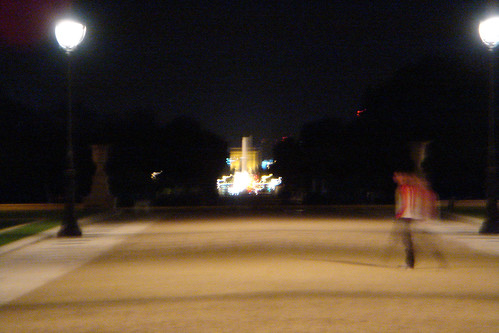The lil suitcase is packed for the grand open ended journey through Northern Italy, Slovenia, —– (fill in your own following destination).
Prior to packing for the journey, I was watching a PBS Frontline Special entitled “The Other Drug War”. I believe it’s and old program, last updated (according to their site) in 2003, but the torrent just fell in my lap the other day. (transcript anyone?)
By the other drug war, the title is referring to perscription drugs for seniors in the United States. All those pills that control cholesteral, blood pressure, depression, asthma, etc etc… they cost senior citizens mounds and mounds of cash. And of course, the catch is, because they need many of these drugs to go on living, they are at the mercy of the drug companies.
In the program itself, we see seniors in Maine organizing bus excursions to Canada, where drug prices are fixed by the government in order to keep them affordable for seniors. (and I guess the poor too) During the bus ride, the people talk about how angry they are at companies for being so unreasonable with prices, and with the government for not intervening. Later the program explains that the state of Maine, as well as a few other states have actually passed laws that will control the price of drugs for seniors.. which of course has been met by huge resistance by the corporations, who have taken the states to court.
On the other side, you also hear from the companies themselves. Mostly from a few reps and many many lobbyists, since apparently pharmaceutical lobbies are the biggest and most powerful in Washington, DC. They explain that the government musn’t control prices or else their profits will suffer, and as a result, they won’t be able to invest in new life saving drugs. They claim that the high prices are because research is so expensive, so the pill costs nothing to make but you’re paying towards future drugs. If the prices lower, the expected response from the company will be to cut down on research. There’s even a French CEO of some big US pharma company (Eli Lilly)who explains that in France the government fixes the prices and therefore France lags behind the US and other countries in research and development. (number 5 in the world apparently, at that time)
And so I the viewer, with some help from the internet and perhaps life experiences, sit here and evaluate the situation for myself. Whats more important… research and development, or access to the existing drugs.
In the end, everyone will have mixed answers. Put yours in the comments. Here’s a brief version of mine:
With most products in this type of capitalistic system of ours, which does not necessarily believe in fostering competition in many areas thought many claim it does, i can understand setting a high price for the cost of making something or researching it. Technology for instance.. computers.. cars.. you want the cool stuff.. you pay more. But when I look at medicine, I see something more than just a product making business. While it may be a business, it effects lives… more specifically.. it can effect if someone lives or dies. While its surely important for research to be properly funded, I’m not convinced that the healthiest way for a society to do it is to run up the profits for pharmaceuticals while making the seniors pay the price. I think a drug, however great it may be, is useless if people can’t afford it anyway.
I said this earlier today and Richard, who’s just arrived here and has worked for many years in hospitals, says that it is the other way around. That controlling prices limits the work of pharmaceuticals and hurts medical advances.
Your turn.

 With that out of the way, I’d like to announce a new series I will be working on for my podcast. Throughout the remainder of 2006, I will be embarqing on a series of podcasts focusing on global mayors.
With that out of the way, I’d like to announce a new series I will be working on for my podcast. Throughout the remainder of 2006, I will be embarqing on a series of podcasts focusing on global mayors.